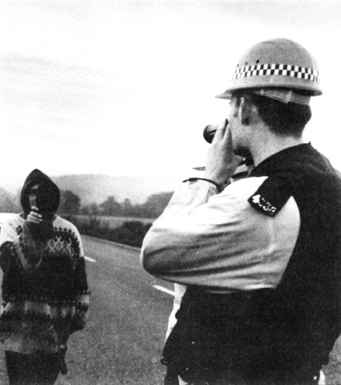
Some have said that if we are justified, we will have nothing to hide and nothing to fear. This might be true if we were playing village cricket, but the State is neither a "good sport" nor a gracious loser. People attending just one peaceful mass rally at Twyford Down found themselves on a DoT Injunction, and were sued for a share of £1.9m - quite a price for a day out! If you seriously challenge the State, they will try to squash you - and if your protest isn't a threat, why are you bothering at all? The more effective you appear, the more harassment you can expect: surveillance, smears, infiltration, heavy policing, systematic violence, and so on. Don't let the fear of this intimidate you, as that's exactly what it's meant to do. Expect it as the price of effectiveness, and be prepared to counter it.
Always avoid being photographed if you can, and never tell them your name, address or anything else, unless you're actually arrested. Get used to looking out for and avoiding (or obstructing!) specialist evidence gathering teams (see page yyy). Don't call out anyone's name in earshot of police or contractors, and be extra careful what you say if there are evidence gatherers around. Face-paints and masks, home-made or from joke shops, are particularly useful to people on bail or injuncted (unless they are the only mask-wearers). You could dress uniformly in certain circumstances; for example, if everyone wears identical cheap boiler suits, the evidence gatherers will have a harder job.
A word about chatting to the police - don't. The police are never on your side, however "nice" they appear, and are always trying to wheedle little nuggets of information from you. Be especially wary of police with specialised "friendly" roles, such as protester liaison. The Metropolitan Police have set up "Forward Intelligence Teams" who get to know activists and groups over a period of time, in an attempt to predict and control actions. We strongly advise having as little as possible to do with this sort of slimy character, except to expose them and their role every time you see them. Of course, the same principles apply to private detectives and other surveillance junkies. Be aware that media coverage is very useful as a source of information to your enemies. Be careful of what you say. If you deal with the media, you might want to use a false name, or insist on being called "a spokesperson". Of course, if you already have a relationship with journalists, and have appeared before, there's little point in this.
Don't give anyone's address or home phone number over the telephone, it is better to take the caller's number and pass it on yourself to the relevant person. Always assume that office phones are tapped and the office is bugged. Never say anything that really matters over any phone. Digital mobile phones are more secure than analogue ones. However, they can still be bugged, and their use allows your position to be tracked to within 50 feet! Mobile phone providers record and store the numbers you call, and where you called them from.
Be very careful with other vital documents (eg. phone trees, address books, message books). Protect and keep safe copies of anything that the police might find useful, and everything the campaign can't afford to lose. Ditch anything that might get anyone into trouble. If someone produces an incriminating document, wipe it from computer discs and hard drives immediately, using an appropriate program (eg. WipeInfo). Burn paper originals. Of course, there needs to be a balance between security and workability, as there's no point having an office if no-one can use it.

Road Alert!
EMAIL: info@roadalert.org.uk